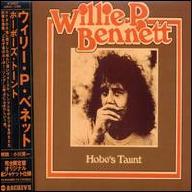Bennett's fascination with music started early. In his junior high school, he was a choir boy and while attending college as a teenager in the late '60s, he started to write his own songs. With these first songs, he already managed to cast a sort of musical spell on his audiences. His recording career started in 1969 with the single White Line, which became a hit in Canada. In the beginning of the '70s, he was part of the bustling new Southern Ontario folk scene which would produce talents like Canada's intrepid songwriter Bruce Cockburn. In 1972, Bennett became a professional musician and formed the Bone China Band, performing his "newgrass" music in clubs and coffeehouses throughout Ontario. Later on, fellow musician and record producer David Essig talked him into releasing some of his favorite songs as his first solo album. Tryin' to Start Out Clean, a refreshing song collection, came out in 1975. Around the same time, Willie P. Bennett joined the bluegrass band the Dixie Flyers, based in London, Ontario, as a harmonica player.
Besides these band obligations, Bennett still pursued his solo ambitions and released Hobo's Taunt in 1977, which was engineered by Daniel Lanois, who would later become one of the most renowned producers in the history of rock music. In 1978, his third album, Blackie and the Rodeo King, followed; around this time, he had also decided to leave the Dixie Flyers in order to concentrate on his solo career again. However, due to the lack of interest in folk music during the '80s, he had only one record release in this decade, 1989's The Lucky Ones. In 1993, he released Take My Own Advice and then cut back on his solo activities by joining Fred Eaglesmith's band the Flying Squirrels as mandolin and harmonica player. With them, he spent most of the '90s constantly touring and appearing at virtually every major folk festival.
The retrospective Collectibles (1996) presented some of Bennett's early recordings from the '70s; in the same year, three Canadian fellow musicians, Colin Linden, Tom Wilson, and Stephen Fearing, released High or Hurtin' - The Songs of Willie P. Bennett, a tribute to their colleague. The beautiful work Heartstrings (1998) proved that Willie P. Bennett was still in peak form and won him the 1999 Juno, the Canadian music industry's Grammy. The album produced shining paint strokes on his musical imagery such as Restless Wind, a collaboration with Byelorussian cymbalon player Vladimir Gorodkine which featured guest performances by Bruce Cockburn and Stephen Fearing. At the end of the '90s, the excellence of Heartstrings moved him into the solo spotlight again. ~ Frank Eisenhuth, Rovi













